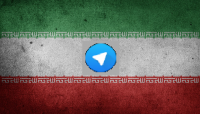
When it comes to internet access, Iran is one of the most heavily censored countries in the world. Millions of websites are blocked in Iran, including popular social media networks, like: Facebook, Twitter, Apple, Google, Youtube, etc. As a result, Iranian internet users have developed their own way to get the closest for a social media platform and it is called “Telegram”. Telegram is a highly secure messaging application that is cloud-based to enable internet users in Iran to communicate with each other and share media files (audio and video content). Though it was developed by 2 Russian entrepreneurs, according to state news agencies, more than 50% of Iran’s population, that is around 45 million citizens, use Telegram.
“The cool thing about Telegram is that you have channels, you have groups, and you have bots where you have hundreds of thousands of members who come and read your posts,” says Niki Aghaei, a creative consultant in Tehran, Iran.
Telegram is not restricted to individual use; a lot of Iranian news portals use the app. Several airlines in Iran also rely on Telegram for online bookings, where passengers can book flights and even make payments to complete their bookings.
“News agencies all have Telegram channels and Instagram pages, and a lot of airline agencies use Telegram bots for bookings. So you can practically search for your flight and put in your payments and you’re done. You get your booking,” Aghaei added.
In a recent turn of events, the Iranian government is cracking down on Telegram. In January this year, at least 32 Telegram users have been detained for “inciting sexual misconduct and creation of immoral content as well as false profiles”. According to the department of Justice in Iran, the 32 detainees posted profane content on their accounts which was enough to issue arrest warrant against them.
In addition, around 78 Iranian netizens have been brought in for investigation on accounts of “publishing false information, disturbing public order, causing public panic, promoting culturally inappropriate content and disturbing public minds”.
Due to its growing popularity, the Iranian government worked to its best interest by exerting control to regulate app use. According to Iran’s Prosecutor General, Mohammad-Jafar Montazeri, at least 16,000-20,000 Telegram channels have been banned by the Justice Department of Iran. Moreover, Telegram end-to-end encrypted voice calling service has been blocked by the Iranian government. In order to expand its control over Telegram, the government also requires users to add an “automated bot to their Telegram channel as a co-administrator” to be able to monitor their activities on the app.
According to Amir Rashidi, an Internet security researcher at the New York-based Center for Human Rights in Iran, “if the [Iranian government] collects Telegram usernames, they can pass it to that ‘bot’ and create a map of who is following any type of Telegram channels.”
This clamp down on the German-based app has grown to include journalists as well as activists that stir public opinion through their political posts on Telegram. For example, Iranian journalist Fatemah Jamalpur stated that she and some of her colleagues have not been able to publish certain posts they have previously shared on Facebook and Twitter.
“My friends in Iran, when they see their tweets republished in these popular channels that talk about politics, they worry. It’s dangerous for us that they republish these tweets,” she said.
Telegram spokesperson, Markus Ra said that the company is not collaborating with the government to assist in tightening internet censorship in Iran.
“Our rules are the same for any country, including Iran and other countries in the Middle East: We do not share data with governments, and we do not engage in political censorship,” he said.
Internet users in Iran can now face charges and get arrested for unidentified periods of time for expressing their opinions on Telegram. They can face prison sentences or get fined for “acting against the regime of Iran,” “assembly and collusion against national security,” or even “blasphemy”.


